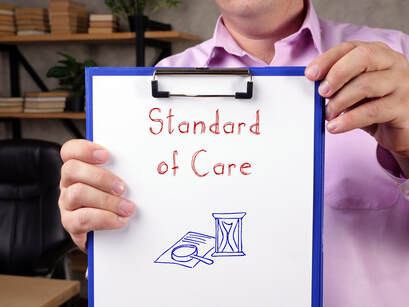 Determining what the standard of care is in a case is frustrating because even the phrase, “standard of care” sounds finite. Using the word “standard” conjures ideas of benchmarks, tests, and objectively measurable data. Life would certainly be easier for the legal (and to be honest, the medical) community if defining a standard of care were so easy, but it's not. The medical practitioner’s duty to the patient is not determined simply by checking boxes in a list of symptoms. It is individual & determined by the specific circumstances of the specific patient (with a unique history) experiencing specific symptoms in a certain place & time. It also must take into account the resources available to the practitioner. An internal medicine doctor practicing in small primary care office in rural Georgia can’t be held to the same standards regarding what laboratory or imaging tests can be run in-house as an internal medicine doctor practicing in a large tertiary referral center. It boils down to the duty of the medical practitioner to know (& put into practice) those medical decisions which any other (“reasonable & prudent”) practitioner would make given the same patient in the same circumstances. That’s why expert physician witnesses are always going to be your best bet when it comes to defining the standard of care on the witness stand (for physicians; you would need a nurse expert witness for the nursing standard of care, etc).  There are some places you can turn to for information before you proceed to the costly step of hiring an expert physician witness. First, you can try checking the national association of whichever specialty the physician in question belongs to. Some specialty organizations issue clinical practice guidelines which inform the standard of care for the physicians certified by that organization (examples include the American College of Obstetrics & Gynecology (ACOG), American Academy of Family Physicians (AAFP)). You can also hire a nurse who specializes in the area. Although nurses can’t (for good reason) serve as testimony-giving expert witnesses to the physician standard of care, you can get a lot of behind-the-scenes insight at a much lower cost. The nurse can point you to the right lines of questioning and may also be able to help you locate an expert physician witness who is willing to testify. Legal Nurse Consultants can help with a wide variety of cases, their scope is not limited merely to medical malpractice. Many offer free consultations, so reach out to an LNC today for help with any case involving medical records or medical history, including or defense, personal injury & more. If you are wondering whether a Legal Nurse Consultant can help with your case, contact us today for a free 30-minute phone consultation to discuss your case.
0 Comments
Leave a Reply. |
Archives
February 2022
AuthorI'm Jennifer Pettigrew and, true story, I first became interested in Legal Nurse Consulting after my auto insurance company was sued following a car accident in which I was found to be at fault. I wasn't sued until after the statute of limitations was up but an exception was made and the plaintiff alleged that because of being rear-ended he was on pain medications chronically which caused him to develop diabetes and become blind. As a nurse I knew that Diabetic retinopathy cannot develop over the course of just a few years but rather is a complication that develops after several years of untreated or poorly treated diabetes. The case was settled by the insurance company before ever going to court for several million dollars, but from that point on I have been interested in the difference medical professionals could make in legal proceedings.
|
Search by typing & pressing enter

 RSS Feed
RSS Feed